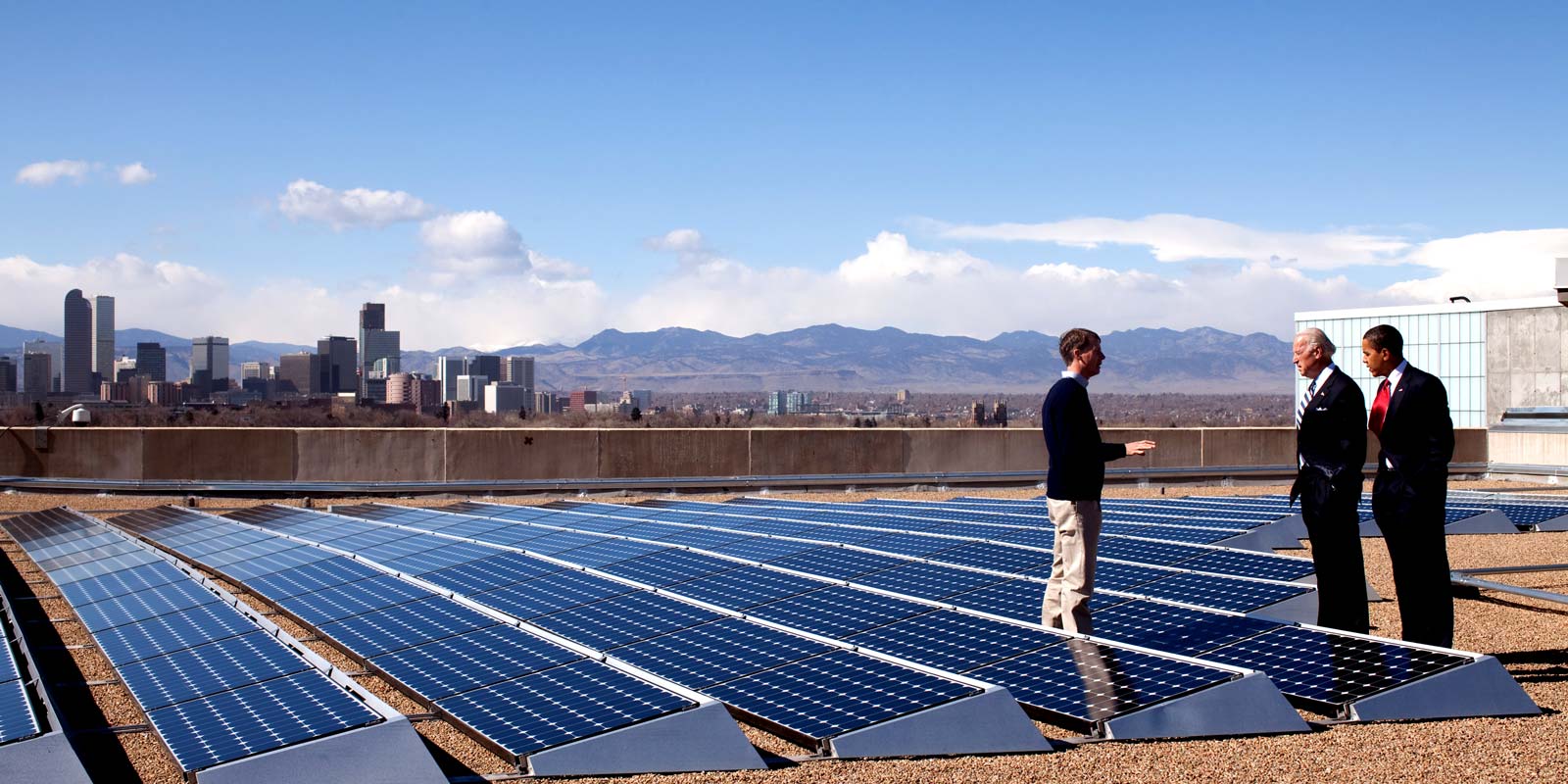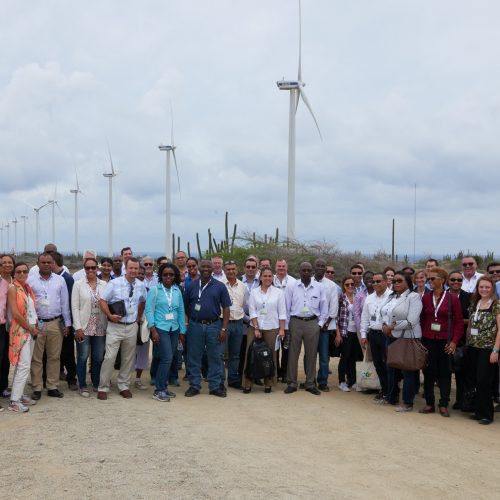RMI's Victor Olgyay shares his perspective on how architects can gain competitive advantage and produce better design by addressing climate change.

Economy and Jobs
Weaning global economies from fossil fuels and creating a world based on clean, renewable energies can increase wealth, opportunity, and jobs.

Economies and individuals suffer from the direct and hidden costs of fossil fuels. We can slash costs and stimulate growth by embracing the clean energy revolution.
Industrialized countries have built their economies on cheap oil and coal. But the cost of these seemingly cheap fossil fuels doesn’t cover even a fraction of the costs society actually pays to mine and burn these fuels, which are on the order of a trillion dollars a year in the U.S. alone. A clean energy future will support economic growth, creating jobs that support new technologies and industries for millions. Our work is helping the world’s biggest energy-consuming countries, and those that are quickly gaining ground, decouple economic success with growing carbon emissions.
According to findings from RMI’s Reinventing Fire, the U.S. can support a 158-percent-bigger economy and unlock $5 trillion in savings requiring no energy from oil, coal, or nuclear sources. Our analysis is supporting the development of similar roadmaps in other major economies such as China.

photovoltaic panels

U.S. Job Creation through Renewables
Goal: Add 60 GW of new large-scale wind and solar to the grid by 2025
The gap between renewable energy jobs and fossil fuel jobs is growing, not only in the U.S., but also worldwide. In 2016, jobs in the solar and wind sectors increased by 25 and 32 percent respectively, while jobs in the coal industry declined by 24 percent. RMI’s work to increase the amount of renewable energy in the U.S. electricity mix will help the nation lead the way in the multitrillion-dollar global clean energy economy and increase the number of well-paying jobs it can bring to American workers.

Improving Island Economies
Goal: Install 95 MW of renewables in the next three years, creating 2,500 jobs for island residents
Island nations spend the vast majority of their GDP importing fuel. The diesel that powers most island economies is expensive to buy, costly to deliver, and greatly affected by global oil price fluctuations. Because of this, island residents pay some of the highest electricity prices in the world. Even with subsidies, they spend a large percentage of their income on their energy bills. Tourism, a main revenue generator, exacerbates the situation by increasing the demand for power for amenities like hotels, air conditioning, and pools. These things make for a great vacation but pose significant threats to the economic health of islands and the people who live on them. By helping facilitate the switchover from diesel-generated electricity to renewable generation systems, RMI is improving the economic well-being of island residents and communities.

Economic Growth through Building Performance
Goal: Increase the energy efficiency of over 4 billion square feet of commercial and residential space in the U.S., and create a pathway to save 56 percent emissions over business as usual in China
The building construction industry employs millions of workers worldwide, an increasing number of whom are focused specifically on sustainable buildings. Major investment in the buildings sector to improve energy efficiency in both new and existing buildings leads to increased jobs in the energy-efficiency segment of the construction industry. In addition, low-income homeowners spend a disproportionate amount on their energy bills, putting them at higher risk of default. Improving energy efficiency in new and existing buildings will increase homeowners’ disposable income—savings that will be spent throughout the wider economy.

Reinventing Fire in China
Goal: Help China grow its economy 600 percent while transitioning to a low-carbon society
RMI’s work in China shows how the country can grow its economy while making an aggressive transition to a low-carbon society. Specifically, by 2050, China could use approximately the same amount of energy it did in 2010 (but with significantly more renewable power) and still grow its economy 600 percent over that timeframe, providing a better standard of living for its people. The path RMI and our partners laid out in our report Reinventing Fire: China shows how China can save $3.3 trillion by dramatically increasing its use of renewables and cutting its use of coal. Reinventing Fire: China maps a path for one nation, yet it can help blaze the path for other developing economies, proving that clean energy can be a powerful instrument of economic growth.

Saving Money by Transforming Mobility
Goal: Reduce the cost of mobility by 80 percent, unlocking $1 trillion in value for consumers, businesses, and municipalities
Our privately owned, individually driven, gas-powered vehicles sit unused 95 percent of the time, and cost their owners over $1 trillion annually. The fully burdened cost of these vehicles is about $3 trillion per year when road construction and maintenance, public lands lost to parking, health costs, and other factors are included. In contrast to the current, just-in-case transportation system, RMI is helping transform mobility to become a service, available when and where it is needed—just in time—or on demand, allowing fewer vehicles to do the same job at a lower cost. Through this transformation, we can reduce the cost of mobility by 80 percent, unlocking $1 trillion in value for consumers, businesses, and municipalities; improving access across all levels of society; reducing congestion; and decreasing emissions by 1 gigaton per year.
Who’s Joining Us to Make a Difference
With the help of motivated philanthropic partners, investors and financiers, business leaders, and other leading institutions, our work proves that efficiency and fossil-fueled energy consumption don't have to go hand in hand. For example, our Islands program is collaborating with The Clinton Climate Initiative (CCI), launched in 2006 to implement solutions to the root causes of climate change. CCI is a key partner in our work to transition island nations to renewable energy and energy efficiency.


The world has a moral imperative to help island nations from disappearing or suffering irreversible damage, and an economic imperative to reduce their reliance on costly imported fossil fuels and build climate resilience to avoid catastrophic disasters. Working in partnership with Rocky Mountain Institute and Carbon War Room, the Clinton Climate Initiative is bringing governments and businesses together to help design, implement, and scale up clean energy projects across the Caribbean and around the world.
‐Former U.S. President Bill Clinton (as quoted in the official press release announcing the partnership)
Stories from the Field
By stepping forward to pioneer new energy approaches, Fort Collins has galvanized support of community leaders and attracted the participation of leading businesses and other institutions in the area, creating jobs and vitality.
Sustainable finance is a growing field. Although finance is not the only tool in transitioning to a more sustainable economy, it is an important one. RMI's Curtis Probst weighs in on how to jumpstart a career in a sector set to boom.
Say goodbye to fuel costs, traffic congestion, parking problems, dirty gasoline… and car driving as you know it. Meet the new mobility, which RMI — with industry partners — is ushering in.



